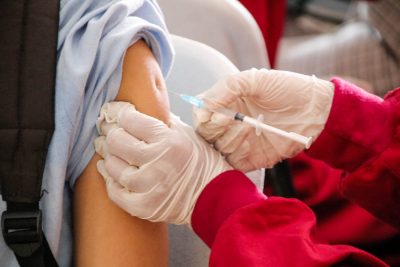By Taylor Brokesh and Samuele Petruccelli
Hundreds of government workers have faced disciplinary action for not complying with mandates to get vaccinated against COVID-19 or provide weekly test results.
As of Oct. 27, 141 state employees have quit or been fired for not following Governor Charlie Baker’s Aug. 19th executive order requiring vaccines for Executive Department employees, the state press office wrote Monday. An additional 362 employees are suspended for a maximum of 10 days due to their noncompliance.

The City of Boston also requires city employees to get vaccinated or tested weekly. Among these employees, 615 of those who frequently interact with vulnerable populations were out of compliance as of Monday, the Mayor’s office wrote.
Then-mayoral candidate Michelle Wu said after Boston University’s Oct. 29 mayoral forum that the City may fire employees who fail to comply with the rules.
“We will need to stand by that mandate of either vaccination or testing,” now Mayor-elect Wu said.
Over 93% of state employees are compliant with Baker’s vaccine order, his office said Monday.
“The Baker-Polito administration is encouraged that nearly all active employees in the executive branch have complied with Governor Baker’s executive order,” Terry MacCormack, a spokesperson for the governor, wrote in a statement. “The administration is making every effort possible to work with the small number of employees not yet in compliance and is reviewing outstanding exemption requests on a rolling basis.”
Wu, who is scheduled to take the city’s top job in less than a week, said safety must be a top priority.
“The City of Boston has to lead the way in ensuring that we’re protecting our workforce and the public,” Wu said. “We are still rolling out the vaccination mandate and working with each employee to either close those vaccination gaps or comply with regular testing.”
Over 2,000 Massachusetts workers, or just over 5% of the workforce, fit neither category of compliance, Baker’s office said. As of Oct. 27, these employees were awaiting a verdict on applications for exemptions, just had their application denied or were on unpaid leave.
In an interview also Oct. 27, President of the Massachusetts State Police Association Michael Cherven said the state government’s application process caused officers to have outstanding exemption requests too close to the compliance deadline.
“That is a direct result of the administration,” Cherven said. “It’s the administration that dragged their feet, that couldn’t make decisions, they changed the paperwork, they changed the questions, they continuously moved the goal posts on us.”
In a Thursday statement posted on Facebook, the association wrote that a few members who are unvaccinated for medical reasons have received accommodations, but called the resulting restrictions “unfair and unreasonable.” Certain troopers are not allowed to wear uniforms or have contact with the public, for instance, according to the police association.
“This is no way to treat our troopers,” the Facebook statement read. “They will most likely be hidden away in some office for the remainder of their careers unable to ever work on the road again.”
Cherven added that having to deal with suspended employees causes staffing problems.
“Even if we lost 10 troopers, we are already well below critical staffing,” Cherven said.
Baker’s office said the administration does not anticipate any significant staffing shortages in the immediate future.
The Association wrote in their statement that they are not against vaccines and are “pro-public safety,” and want unvaccinated officers to mask up and return to work.
Paul Beninger, professor of public health at Tufts University, said there is more widespread resistance to the COVID-19 vaccines than other immunizations.
“What’s different about this one is the politicization of it, and I might even go so far as to say weaponization of it,” Beninger said. “And I think that’s important because it’s not simply a refusal, which is more of a defensive action, it’s actually become an offense.”
State troopers getting vaccinated protects them against COVID-19 in a job with a high risk of transmission, Beninger said. Officers are likely interacting with members of the public they do not know, he said, unlike office workers who engage with familiar groups of coworkers.
“Whether it’s pulling cars over or people on the street or any sites they’re investigating or asking questions about, they don’t know these people,” Beninger said. “So, these folks are probably at the second highest risk behind actual healthcare providers.”
Cherven said he was “first in line” to get the vaccine in January, and encouraged his members to get vaccinated as well.
Lloyd Fisher, Massachusetts Chapter of the American Academy of Pediatrics president,said speaking with doctors can help resolve fear created by vaccine misinformation.
“We all understand that people may have hesitations,” Fisher said. “Just ask. Ask a healthcare provider that you trust.”

















































































































